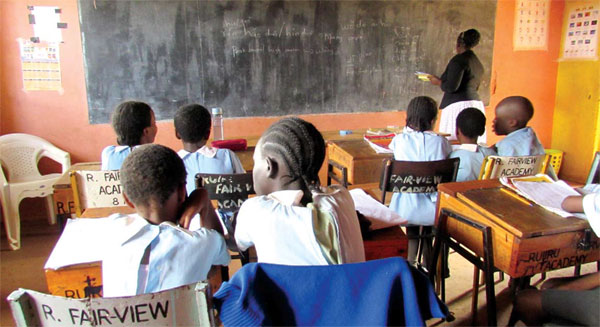Kenyan school with Chinese characteristics

Confucius Institute helps give primary school pupils at private academy in Nairobi a head start
While Kenyan authorities plan to start introducing optional Chinese classes in the nation's schools in 2017, a few private schools are using volunteer teachers to give young pupils a taste of the language and the Asian nation's culture.
Ruiru Fairview Academy, in the Nairobi suburbs along Thika Road, in 2011 became one of the first to offer the optional classes thanks to a partnership with Kenyatta University Confucius Institute.
| Pupils in Standard Six at Ruiru Fairview Academy learn Chinese. The school has a kindergarten and classes from Standard One to Standard Eight. Photos Provided to China Daily |
| Left: Students of Standard Six at Ruiru Fairview Academy learn Chinese at the school, located in the suburbs of Nairobi. Right: James Njogu teaches classes other than Mandarin at the academy but will soon take the standardized HSK exams in the language. |
After Ruiru Fairview, "other schools like Rusinga Academy followed suit and now the government of Kenya wants to introduce Chinese language to public schools," says Magdalene Chebe, the school's principal.
Mandarin was not just an abstract concept for the pupils, Chebe says.
"When we started teaching Chinese, three different Chinese contractors were building the Thika highway. So our students were having a lot of fun interacting with the Chinese working on the road after school," she says.
Construction of the $360 million, 50-km highway also employed over 4,000 local workers.
Chebe says she has been fascinated with China's language and culture since taking the job four years ago. She visited Confucius Institute Headquarters, also known as Hanban, in Beijing for a meeting in 2013. Hanban, a Chinese government institution, provides language and cultural teaching resources worldwide.
The Kenyatta University Confucius Institute, 6 km away, has helped raise the level of Chinese-language education, helping to find teachers, source teaching materials and organize field trips, Chebe says.
"(Martin) Njoroge, the first director of the Kenyatta University Confucius Institute, built the institute from the ground up. He facilitated my travel to Beijing by virtue of Ruiru Fairview Academy being among the first primary schools in Kenya to offer Chinese language," Chebe says.
There are more than 480 Confucius Institutes at colleges, universities and secondary schools worldwide, including four in Kenya.
Parents of pupils at the school are willing to pay a little extra to cover the expenses of the volunteers who teach the after-hours optional classes, Chebe says.
She says a big challenge in teaching Chinese at her school is that they do not have permanent teachers. The volunteers are students from the Confucius Institute and change every other term.
"One of our teachers will not be with us next term. She is still a student at Kenyatta University. We have felt her impact since her arrival and it's a pity she has to go," Chebe says.
The teacher, Emmah Wangari, is a former student at the Confucius Institute. She was full of praise for her students and says the biggest hurdle has been juggling her own studies and teaching.
"I teach Chinese at the Experts College in Thika and here at Ruiru Fairview Academy. I'm also finishing my degree at Kenyatta University. Finding a balance has been hard," she says. She is preparing her students for the Young Chinese Test this month.
James Njogu teaches subjects other than Chinese at Ruiru Fairview, but he is a student at the Confucius Institute and will soon take the HSK exams, the standardized test for Chinese proficiency. He says: "The primary school students have gone on various field trips, especially to Kenyatta University, which has helped them to get a grip on the Chinese language."
Anthony Chebe, an administrator at the Kenyatta University Confucius Institute, says supporting Ruiru Fairview and other schools, such as Juter Academy in Githunguri, ACK St. James Academy in Kiambu and the United States International University (Kenya), was a way to give something back to local communities.
"We support our partners with teachers and audio-visual material," he says. The institute itself has "native Chinese speakers to help students to get a deeper understanding of the language."
Lydia Nzomo, director of the Kenya Institute of Education, was among government representatives who attended the Beijing meeting in 2013. She says it was then that the proposal was made to introduce Mandarin in Kenyan public schools.
"I attended the meeting because of my experience in leading a school that offered Chinese-language education," she says. "Officials from Hanban were very positive on the proposal and said they were ready to facilitate."
Kenyan officials say public school students will be offered optional Chinese classes in 2017, starting with those entering the first years of primary and secondary school.
The youngest pupils to be offered Chinese will be those in Standard One, the first primary year, who are usually about 6 or 7 years of age and are just out of nursery school.
Julius Jwan, director of the Kenya Institute of Curriculum Development, said all Form One students - in their first year of secondary school, which would be ninth grade - will also be offered Mandarin classes starting in 2017.
Those two groups of students would be able to continue their Chinese studies in subsequent grades, leading to the addition of new levels every year.
Magdalene Chebe says she was impressed with what she saw in China and hopes the leadership in her country can emulate China in pushing the development agenda.
"If only it would emulate a fraction of what is in China, Kenya would be at a similar level with countries in the East such as Singapore, China and South Korea," she says.
For China Daily
(China Daily Africa Weekly 10/16/2015 page26)
Today's Top News
- Crossing a milestone in the journey called Sinology
- China-Russia media forum held in Beijing
- Where mobility will drive China and the West
- HK community strongly supports Lai's conviction
- Japan paying high price for PM's rhetoric
- Japan's move to mislead public firmly opposed
































